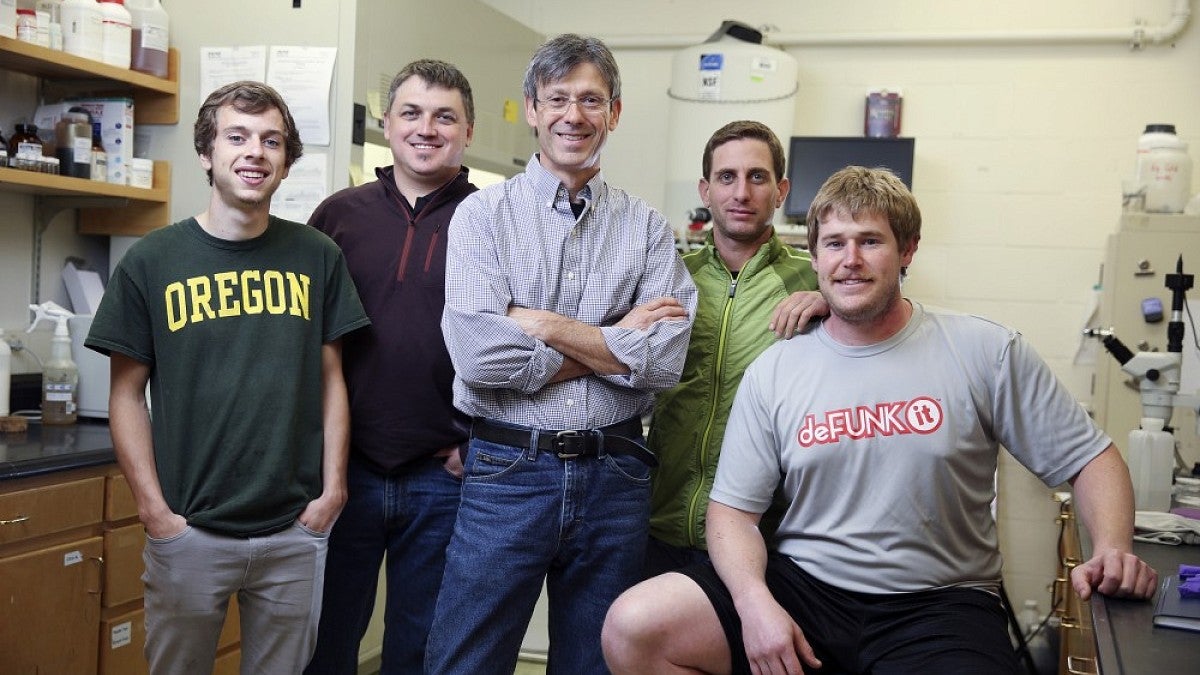A fabric treatment developed by a University of Oregon spinoff company is being used to permanently block tough smells from entering athletic shirts and other clothing — ideally allowing runners or athletes to wears shirts several times before they ever need to be washed.
deFUNKit, an odor-control solution for natural and synthetic fabrics, creates a layer of protection for shirts and socks by “gluing” natural deodorizers like baking soda to clothing fibers – a scientific process called textile bonding. The resulting odor shield, which allows clothing to be worn up to seven times before needing to be washed again, doesn’t just cover up smells – it stops them from penetrating clothing in the first place.
Developed by Dune Sciences, located in the UO’s Riverfront Research Park, deFUNKit consists of a super detergent prewash solution that removes the buildup that causes persistent odors and a two-part fabric treatment that prevents stink from returning. The product is currently being sold online and in a handful of local bike and athletic stores.
“We initially plan on selling the durable odor-control product online and in specialty stores that cater to human-powered sports, like running and cycling,” said Dune Sciences CEO Richard Geiger said. “Eventually we plan on targeting larger retailers through national distributors.”
UO chemistry professor Jim Hutchison co-founded Dune Sciences with John Miller, another nanomaterials expert, with the intention of developing nanotechnologies. Geiger said he joined the company a year and a half ago to help commercialize the company’s research products. In addition to deFUNKit, Dune Sciences is developing separate antimicrobial products for medical manufacturers and commercial cleaners.
Geiger said he became interested in Dune Sciences after renting space in the same tech business incubator and hearing someone complain that towels don’t dry very fast in damp western Oregon and end up kind of smelly. But then he used a towel that had been treated with deFUNKit, and the results were amazing.
“You could use a towel until it was stiff like cardboard and it wouldn’t smell bad, and so that was kind of the impetus for me getting involved in the company,” he said.
The odor-control treatment is a simple, two-step process. Geiger said the garment is first soaked in a solution, which looks like lemonade and contains natural deodorizers like baking soda along with sugars and gelatin. A binder agent is then added to the solution, which causes the particles to permanently bond to the clothing fibers.
The deFUNKit prewash contains enzymes and color-safe bleach materials formulated to remove detergent buildup and return garments to a like-new condition, according to Geiger.
“We’ve coated socks that were used in the last Olympic trials for track and field,” he said. “There’s been probably tens of thousands of people who have participated in those pilot studies.”
Geiger said fabrics can be worn up to seven times before they need to be washed, and the typical treatment lasts for about 20 regular washes. Garments treated with deFUNKit do not have an odor and can be washed normally.
The antimicrobial products being developed by Dune Sciences, which have yet to receive EPA approval or hit the market, use silver nanoparticles to prevent bacteria from growing on fabrics. While deFUNKit does include small amounts of silver used as a colorant, the odor-control solution is not intended to be used as an antimicrobial product.
Hutchison said silver has been studied extensively and found to have no adverse effects on humans. That includes nanoparticles, which also have been examined closely for possible health risks. Hutchison estimated that hundreds of millions of dollars have been spent to understand the safety of the particles.
“We actually have an Environmental Protection Agency-funded center on campus that studies the impacts of nanoparticles in the environment and with organismal health,” he said.
Silver is nontoxic, and it’s common for people to take silver health supplements, Hutchison said.
“In fact, it’s not surprising because humans have used silver for millennia and we know that even large containers like pitchers and goblets that were used thousands of years ago give off silver particles, so humans have been exposed to them for a long time,” he said.
As for deFUNKit, Geiger said the product passes the smell test.
“We’ve given kind of an unofficial smell test for socks. So people take them and wear them for two weeks and see if they smell bad,” Geiger said.
―By Corinne Boyer, Public Affairs Communications intern


